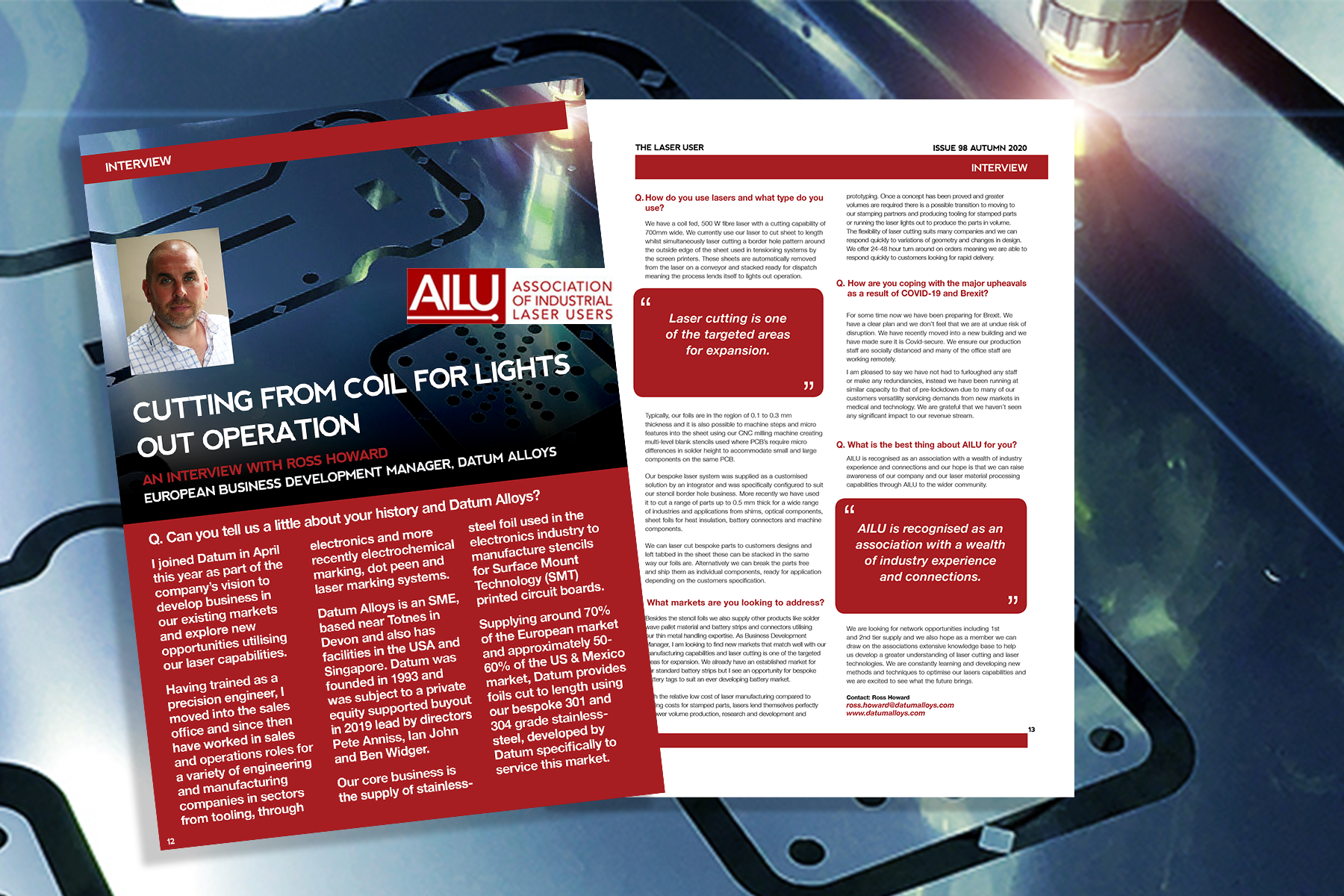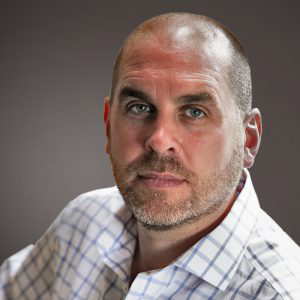News - 11.24.2020
Association of Industrial Laser Users – Datum Article
The Association of Industrial Laser Users interview Ross Howard - European Business Development Manager at Datum Alloys

 Ross Howard
Ross Howard
CUTTING FROM COIL FOR LIGHTS
OUT OPERATION
THE ASSOCIATION OF INDUSTRIAL LASER USERS INTERVIEWS ROSS HOWARD – EUROPEAN BUSINESS DEVELOPMENT MANAGER AT DATUM ALLOYS
Q. Can you tell us a little about your history and Datum Alloys?
I joined Datum in April this year as part of the company’s vision to develop business in our existing markets and explore new opportunities utilising our laser capabilities.
Having trained as a precision engineer, I moved into the sales office and since then have worked in sales and operations roles for a variety of engineering and manufacturing companies in sectors from tooling, through electronics and more recently electrochemical marking, dot peen and laser marking systems.
Datum Alloys is an SME, based near Totnes in Devon and also has facilities in the USA and Singapore. Datum was founded in 1993 and was subject to a private equity supported buyout in 2019 lead by directors Pete Anniss, Ian John and Ben Widger.
Our core business is the supply of stainless steel foil used in the electronics industry to manufacture stencils for Surface Mount Technology (SMT) printed circuit boards.
Supplying around 70% of the European market and approximately 50-60% of the US & Mexico market, Datum provides foils cut to length using our bespoke 301 and 304 grade stainless-steel, developed by Datum specifically to service this market.
Q. How do you use lasers and what type do you use?
We have a coil fed, 500 W fibre laser with a cutting capability of 700mm wide. We currently use our laser to cut sheet to length whilst simultaneously laser cutting a border hole pattern around the outside edge of the sheet used in tensioning systems by the screen printers. These sheets are automatically removed from the laser on a conveyor and stacked ready for dispatch meaning the process lends itself to lights out operation.
Typically, our foils are in the region of 0.1 to 0.3 mm thickness and it is also possible to machine steps and micro features into the sheet using our CNC milling machine creating multi-level blank stencils used where PCB’s require micro differences in solder height to accommodate small and large components on the same PCB.
Our bespoke laser system was supplied as a customised solution by an integrator and was specifically configured to suit our stencil border hole business. More recently we have used it to cut a range of parts up to 0.5 mm thick for a wide range of industries and applications from shims, optical components, sheet foils for heat insulation, battery connectors and machine components.
We can laser cut bespoke parts to customers designs and left tabbed in the sheet these can be stacked in the same way our foils are. Alternatively we can break the parts free and ship them as individual components, ready for application depending on the customers specification.
Q. What markets are you looking to address?
Besides the stencil foils we also supply other products like solder wave pallet material and battery strips and connectors utilising our thin metal handling expertise. As Business Development Manager, I am looking to find new markets that match well with our manufacturing capabilities and laser cutting is one of the targeted areas for expansion. We already have an established market for our standard battery strips but I see an opportunity for bespoke battery tags to suit an ever developing battery market.
With the relative low cost of laser manufacturing compared to tooling costs for stamped parts, lasers lend themselves perfectly to lower volume production, research and development and prototyping. Once a concept has been proved and greater volumes are required there is a possible transition to moving to our stamping partners and producing tooling for stamped parts or running the laser lights out to produce the parts in volume. The flexibility of laser cutting suits many companies and we can respond quickly to variations of geometry and changes in design. We offer 24-48 hour turn around on orders meaning we are able to respond quickly to customers looking for rapid delivery.
Q. How are you coping with the major upheavals as a result of COVID-19 and Brexit?
For some time now we have been preparing for Brexit. We have a clear plan and we don’t feel that we are at undue risk of disruption. We have recently moved into a new building and we have made sure it is Covid-secure. We ensure our production staff are socially distanced and many of the office staff are working remotely.
I am pleased to say we have not had to furloughed any staff or make any redundancies, instead we have been running at similar capacity to that of pre-lockdown due to many of our customers versatility servicing demands from new markets in medical and technology. We are grateful that we haven’t seen any significant impact to our revenue stream.
Q. What is the best thing about AILU for you?
AILU is recognised as an association with a wealth of industry experience and connections and our hope is that we can raise awareness of our company and our laser material processing capabilities through AILU to the wider community.
We are looking for network opportunities including 1st and 2nd tier supply and we also hope as a member we can draw on the associations extensive knowledge base to help us develop a greater understanding of laser cutting and laser technologies. We are constantly learning and developing new methods and techniques to optimise our lasers capabilities and we are excited to see what the future brings.
ISSUE 98 AUTUMN 2020 – THE LASER USER
Association of Industrial Laser Users – www.ailu.org.uk